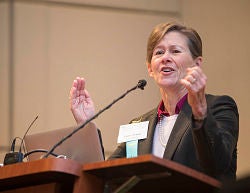Enhancing and improving health care in the millennium

Janice C. Probst, director of the South Carolina Rural Health Research Center, speaks March 1 in the East Carolina Heart Institute at ECU. Photo by Cliff Hollis.
GREENVILLE, N.C. (Mar. 4, 2013) — The future of electronic health applications may be as a close as a bird chirping outside your window.
Janice Probst, a leading researcher in rural health disparities, asked participants at the ninth annual Jean Mills Health Symposium on Friday to imagine a system like eBird.
Launched by the Cornell Lab of Ornithology and National Audubon Society in 2002, eBird is a real-time data resource that allows citizens to contribute their bird sightings for use in science and conservation. When it launched, the site had about 50,000 observations per month. Now, it has 1 million bird observations on average each month, growing by about 40 percent each year.
Tracking and managing the health care of patients in a similar way to the birding application could be transformative, Probst said.
“Can you imagine if we could do it for asthma, which has internal and environmental triggers, or if we could do it for congestive heart failure and link it to fast-food places?” Probst said. “When you really get people engaged, they’re doing the science.”
An uptick in bird observations on the eBird site came after the organizers found out what birders wanted, not what scientists thought they wanted. “We’ve got to be doing community-based development work here,” Probst said. “If you’re not talking to people who will be using it, you’re doomed.”
For Probst, who started out in computer programming in the 1970s, the idea is fascinating, she said. “This is the promise of e-health,” she said.
Probst, the keynote speaker for the symposium, leads the federally-funded South Carolina Rural Research Center and is a professor in the Department of Health Services Policy and Management in the Arnold School of Public Health at the University of South Carolina.
Backed by research, charts and graphs, Probst demonstrated that social inequities lead to health inequities. Rural minority populations experience significant inequities in access to providers, financial access to care and social determinants in general.
The theme of this year’s Mills symposium, “Enhancing Minority Health in the Millennium” featured sessions on reaching underserved areas and improving health care outcomes with the use of technology and cultivating campus-community health partnerships in reducing health disparities.
Much of North Carolina has broadband coverage, even in many rural areas, although about 66 percent of people in rural areas nationwide don’t have smart phones, Probst said.
The state’s physicians are also leaders in e-prescribing, ranking in the top 10 percent in the nation, Probst said.
“E-interventions are multiplying,” she said, noting the availability of glucose monitoring from phones to “Asthmaopolis,” a mobile application and sensor that can help people track their symptoms, triggers and use of medications. There’s even an app for diagnosing melanoma. But she said there is no FDA regulation for smart phone applications at this time, so people should be cautious with the growing field that is still being tested.
Attendees at the symposium included ECU occupational therapy faculty members Debbie Amini and Annette Jones. “We’re interested in preventative care and ensuring people have access to care so they can participate in life endeavors,” Jones said.
Jean Elaine Mills, the symposium’s namesake, earned her master’s degree in public administration with a concentration in community health from ECU in 1984. She died of breast cancer in 2000.
Her brother, Amos T. Mills, created the symposium in an effort to keep her spirit of discovery and community outreach alive through an inspirational tribute to one of her former graduate school instructors, Dr. Donald Ensley, former chairman of the Department of Community Health in the College of Allied Health Sciences.
“We have an obligation to make the lives of those around us better,” Mills said. “Health care is the most important thing in life.”
The event, held at the East Carolina Heart Institute at ECU, was presented by the College of Allied Health Sciences in collaboration with the ECU Medical & Health Sciences Foundation and the ECU Office of Continuing Studies.
A broadcast of the symposium will be available online at http://www.ecu.edu/ah.